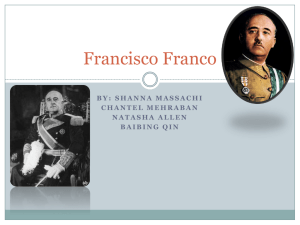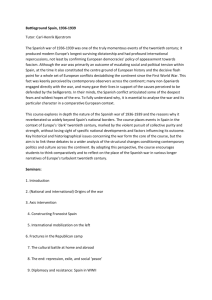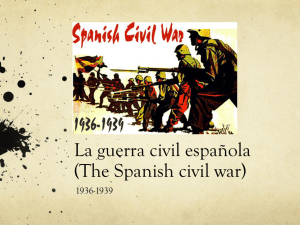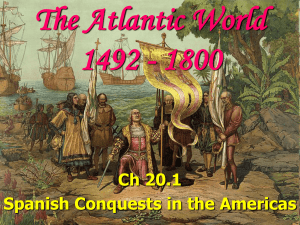THE SPANISH CIVIL WAR 8/7/1936 – 28/3/1939
advertisement
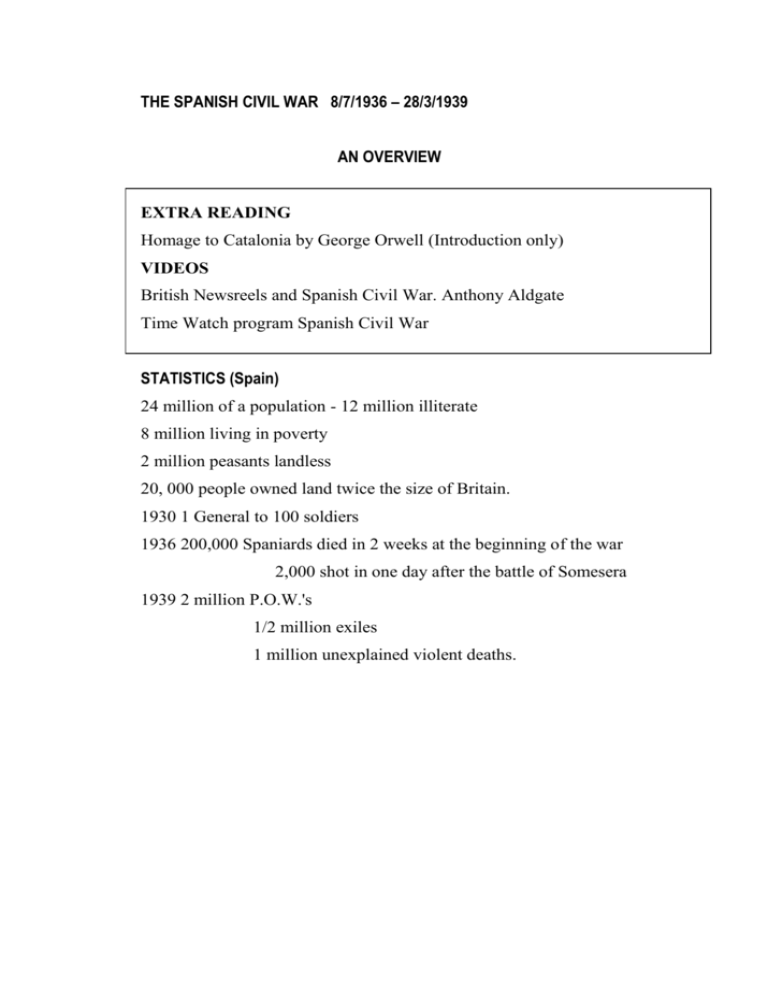
THE SPANISH CIVIL WAR 8/7/1936 – 28/3/1939 AN OVERVIEW EXTRA READING Homage to Catalonia by George Orwell (Introduction only) VIDEOS British Newsreels and Spanish Civil War. Anthony Aldgate Time Watch program Spanish Civil War STATISTICS (Spain) 24 million of a population - 12 million illiterate 8 million living in poverty 2 million peasants landless 20, 000 people owned land twice the size of Britain. 1930 1 General to 100 soldiers 1936 200,000 Spaniards died in 2 weeks at the beginning of the war 2,000 shot in one day after the battle of Somesera 1939 2 million P.O.W.'s 1/2 million exiles 1 million unexplained violent deaths. Differing views on the Spanish Civil War Was it a struggle against Fascism? or Was it a prelude to Nazism and W.W.II or? Was it just a Spanish internal problem being sorted out? League of Nations viewed it as an internal conflict and not their concern. In fact limited use was made of the machinery of the League by the powers in an attempt to prevent the Spanish conflict from escalating into a general European war. The whole of Europe, U.S.A. and Britain saw Russia as a threat and any involvement by Russia might lead to a Moscow type government in Spain. Franco wanted rid of the Red Army out of Spain (This he achieved in 1939) Britain, France, Germany, Italy and Russia tried to put into effect a policy of non-intervention. SPANISH CIVIL WAR PARTICIPANTS:The Spanish Government - REPUBLICANS LEFT WING Anarchic/Syndacilist. - Trade Union Anarchists Marxists P.O. U .M. - off shoot of Marxists, more extreme. Fell out with Stalin as would not take orders. E. T .A. - Basque separatists Catalans Mass of workers Some army officers International Brigade - Republican sympathisers, Communists and left wing of U.S.A., Canada, Britain The Rebels - NATIONALISTS the Labour party members from France. RIGHT WING Falange - semi-Fascist party formed in 1934 by Primo de Rivera's son. Carlists - Royalists Middle Class Army Officers Church. INVOLVEMENT OF EUROPEAN POWERS FRANCE A Republican country keen to help but experiencing trouble at home. The government of Leon Blum was unstable and they were frightened if they offered too much aid this might cause a Right wing backlash at home. Also Baldwin P.M. of Britain threatened France by saying that Britain would not abide by the terms of the Locarno agreement and help France against Germany if France continued to aid the Popular Front in Spain. France suggested therefore that no power should intervene in Spanish problems and Britain suggested forming a Non-intervention Committee. BRITAIN Baldwin's Conservative government was frightened of interfering. They saw Franco as a buffer against Spain becoming Communist. They didn't want to antagonise Mussolini. Many Conservatives sympathised with Franco. The bombing of Guernica (26/4/1937) put the wind up Baldwin who didn't want to see that sort of thing happen in London. NB see later about the hidden agenda of Britain re the Rio Tinto affair. The Labour party (Left wing) on the other hand felt that by pursuing a policy of non- intervention, Britain was in fact not helping the legitimate Republican government (as recognised by the League of Nations ) get much needed supplies whilst the rebels were being illegally aided by Portugal, Germany and Italy. They felt that Britain could stop the spread of Fascism by aiding the Republicans. GERMANY Hitler took the view that it was a war between Jewish Bolshevism the oppressors of peoples and the Nationalists who were being called the Rebels. He saw the Spanish Civil war as a testing ground for his Airforce (Guernica). His Condor Legion gave help with dive bombers and air transport. Hitler was also happy to see Italy tied up in Spain so he was free to act in Austria (Anschluss). Hitler was also keen to get vital raw materials which Spain could supply, iron ore, iron pyrites. He would need these for his war effort. ITALY Again Mussolini was seeking to spread Italy's sphere of influence and also may have had designs on Balearic Islands. Mussolini felt this was an ideological war and could identify with Franco's authoritarianism. SOVIET UNION Stalin was on the side of the Republicans. He sent them just enough aid to keep them going. He knew that Britain and France would not tolerate a Communist government in Spain, but he was happy to keep the war going on as it took the attentions of Germany and Italy away from Russia. 1936 NON-INTERVENTION COMMITTEE Set up in London as Britain was seen as neutral in this conflict. Aim to stop anyone intervening in Spain. 26 countries attended the first meeting. Problems Italy signed the treaty and left. Did not really constitute a signed treaty, was only a gentleman's agreement. Each participating country agreed for reasons of self interest on the assumptions about other countries. Britain was concerned at the time about Germany. Was Germany ready for war? Germany was concerned about France. Advantage to Britain it was not a treaty so she did not have to declare her neutrality and as such her merchant shipping etc. could move unimpeded in Spanish waters without having to ask Franco's permission. Did the Non-intervention Committee prevent war breaking out earlier than 1939? How ready was Germany and Italy? Suggestions are that they were not. The Committee did not take any reprisals when guns were sent to Spain The League had no clout. Agreement was seen merely as a P.R. exercise. Non-intervention agreement was an attempt to make Spain a side issue. There were attempts by the British government to play down the situation in Spain by reporting that the public really were not interested. Public opinion would appear to be the opposite (Red Brigade) The government had a hidden agenda and good reason for playing down the Spanish situation. Historians today feel that Non-intervention agreement sent a clear message to Hitler and Mussolini that Britain would not get involved. BRITAIN’S ATTITUDE Rio Tinto Co. Britain was involved in taking Spanish minerals. This was the economic reason why British interests did not want Britain's involvement. British fears re U.S.S.R. taking control of Spain. Britain wanted to patch up relations with Italy Britain wanted her merchant shipping to travel in Spanish waters unimpeded. Britain did not want another war. Historians have put forward the theory that the policy of nonintervention really was the opposite because they allowed the war to carry on. N.B. The aircraft taking Franco to Morocco was owned by a British company piloted by a Brit and the men accompanying Franco were British Secret Service men. Left wing socialists, intellectuals and some Labour MPs opposed the National Government’s policy of non intervention. C. 2000 British joined the International Brigades and went off to fight against “the spread of Fascism”. GERMANY'S ATTITUDE Germany sent the Condor Legion. This was vital practice for Germany and a precursor to WWII. First time this type of bombing was used when Madrid was bombed. Germany also used new tactics - Blanket bombing Guernica was filmed and sent back to Goering. This was the first time that Henkels and Nunkers were used. Germany had economic reasons for using force against the Communists in Spain (iron pyrites). At the end of the war Germany sent Franco a bill for the war effort. She hoped part of the payment would be made in cash and part in iron pyrites. ITALY'S ATTITUDE She sent more men that Germany She made no demands on Spain NYON CONFERENCE August 1937 Non-intervention was not working. The blockade set up to stop weapons getting into Spain was ineffective. Mystery submarines (Italian) torpedoing ships taking supplies to the Republic. As a result a conference was called for by Britain at Nyon near Geneva to discuss this matter. Germany and Italy did not attend. British and French navies were ordered to destroy submarines or aircraft attacking non-Spanish ships in the Mediterranean. Republicans asked for protection to be extended to Spanish ships but this was refused. Piracy stopped immediately. Being firm had paid off, but the lesson was not learned. Italy stops piracy but sees aid to Franco as OK Russian aid to Republicans is cut. FRANCO WON BECAUSE 1. He had successfully galvanised the forces of the Right in Spain behind him. They accepted him as their leader. 2. The Republican coalition in the early days were divided by mistrust of the different parties 3. The war was fought on conventional lines it was not fought using Guerrilla tactics and thus the army generals had a slight edge over their opponents. 4. Franco received more regular and more substantial aid from Germany and Italy than the Republicans got from Russia or from the International arms trade. 5. The government excesses in the first days of the war had antagonised international finance and enabled Franco to receive credits from abroad in particular the Texas Oil company. 6. The Republican militia made up of factions which reflected their own political leanings not only fought the Rebels but also quarrelled amongst themselves. The end of the war saw many thousands of Spaniards fleeing over the Pyrennes into France. No help was given to the men of the International Brigade who had to make their own way home. Large numbers of government sympathisers were imprisoned and shot. The outbreak of W. w.n prevented any financial aid being given to Spain to help her re-build. CONCLUSION The policy of 'non-intervention' as it was called, agreed by Germany, France, Russia, Britain and Italy astonished the Republic because it treated Franco as an equal of the lawful government of Spain. Germany and Italy ignored most of the decisions taken and left the committee in June 1937. France continued to supply as much material to the republic as she dared without offending Britain whom she would need as an ally in any possible conflict with Germany. Russia left the committee in Oct.1936 and helped the Republic. Only Britain and U.S.A. kept to the policy of non-intervention refusing the Republic help. Franco was able to win with weapons and men supplied by the two Fascist countries. The American Ambassador to Spain at the time said, "World War 2 began in Spain in 1936." By upholding their policy of non~intervention Britain and the U.S.A. had allowed their future enemies to win round one CHRONOLOGY OF EVENTS 1936 8 July, outbreak of Spanish Civil War. Conflict begins with revolt in Spanish Morocco. 4 September, rebels capture Iron in the north 1 October, General Franco appointed Chief of Spanish State by Rebels. 18 November, Germany and Italy recognise government of Franco. 1937 18 March, loyalist forces defeat Italian troops at Brihuega 26 April, Guernica bombed l8 June, Bilbao falls to Rebels 21st October, Franco's troops capture Gijon and complete reduction of Northwest 28 November Franco announces naval blockade of entire Spanish coast 5 December loyalists begin counter-offensive around Teruel. 1938 I5 February, Franco's forces recapture Teruel. 1 April, Rebels take Vinaroz. Mussolini withdraws some troops from Spain but 40,000 remain. 23rd December, Rebels begin great drive in Catalonia and gradually drive loyalists back towards Barcelona. 1939 26 January, Barcelona taken by Franco's troops. Loyalists resistence collapses in this sector. 27 February, Great Britain and France finally recognise Franco's government without conditions. 28th February, President Azana resigns. 28 March, Civil War ends with the surrender of Madrid and Valencia. Members of the Defence Council flee. 1 April, Rebel armies in control in all main cities of Spain GB and France non intervention policy is discredited. Democratically elected Spanish Govt not helped, while rebel right wing Nationalists succeed in violent overthrow. Spain now an ally of Hitler so French encirclement by fascists almost complete. Rome-Berlin Axis much stronger. Stresa Front a dead duck.
